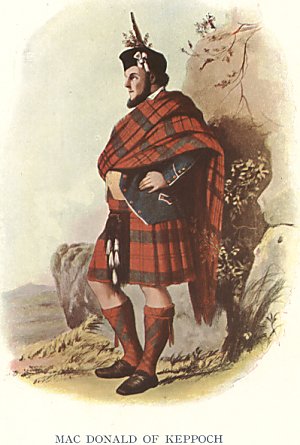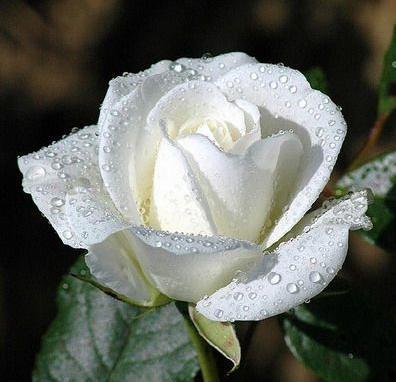
Flora Macdonald (1722-90) (Fionnghal NicDhòmhnaill) was born in Milton, South Uist.
Flora (or Fiona) MacDonald was the daughter of Ronald Macdonald, a tacksman (gentleman freeholder of a grant of clan land) but he left her an orphan when only a year old.
Flora MacDonald's mother married a Macdonald of Annadale, in Skye, who, at the time of the Jacobite uprising, commanded one of the militia companies raised on the island by Sir Alexander Macdonald for the services of the government.
While visiting her brother at Milton in June 1746, to drive his cattle to their summer pasture, she was awoken one night to be told that she must leave the cattle-tending and assist a prince in distress.
Her encounter in Ormaclett, South Uist, on 20 June 1746 with Prince Charles Edward Stuart, then fleeing from the consequences of his defeat at the battle of Culloden, was to make her immortal in Scottish history.
Flora decided to take the prince to safety - disguised as her maid "Betty Burke'"- on Skye. On 28 June the party set out from Rossinish in Benbecula and journeyed for 15 hours under threat of capture by government troops to Mugstot House, from where she guided the prince to Kingsburgh House, the home, as it turned out, of her future husband; he said goodbye to his saviour on 1 July at Portree. As a gift Charles gave Flora a gold locket with his portrait.
 The Bonnie Prince takes leave of the loyal and courageous Flora MacDonald
The Bonnie Prince takes leave of the loyal and courageous Flora MacDonaldAfter further adventures the prince escaped to France, but Flora was arrested for her part in the escape plan and was held on the Royal Navy vessel HMS Furnace. Afterwards, Flora was a prisoner in Dunstaffnage Castle. After being conveyed from place to place, she was eventually transferred to London, where she remained in confinement for eight months (she was discharged at the special request of Frederick, Prince of Wales, father of King George III, without a single question having been put to her).
 The Bonnie Prince with Cameron of Lochiel and MacDonald of Clanranald
The Bonnie Prince with Cameron of Lochiel and MacDonald of Clanranald
In 1750 Flora married Alan Macdonald of Kingsburgh and produced a family of seven children. At the age of 51 she emigrated with her family to the then British territory of North Carolina and was active in recruiting Highlanders to fight for the British in the American War of Independence, in which her husband was taken prisoner. Flora returned to Britain via Nova Scotia in 1778. Two years after her husband's release, they returned together to settle once more at Kingsburgh.
Some ask: how could she support the British government in America?
Simply this: she recognised that the rebellious American War of Tax Evasion (for such it was) had no legitimacy whatever.
She was not a believer in revolution or rebellion; she was not a revolutionary, nor a nationalist nor a Socialist nor a Marxist but was a believer in lawful and legitimate government.
She supported Bonnie Prince Charlie because he and his father, James Francis Edward Stuart, were the rightful king and heir and James was the rightful head of the British government, excluded by rebellious Whigs simply because he was a Roman Catholic.
 Prince James Francis Edward Stuart, King James III and VIII, excluded from his rightful throne because he was a Catholic and for no other reason
Prince James Francis Edward Stuart, King James III and VIII, excluded from his rightful throne because he was a Catholic and for no other reasonShe did not believe that the restoration of the Stuarts was a rebellion at all. Like the Catholic Church, like St Thomas Aquinas, she utterly rejected rebellion - and the English Whigs were rebels against the lawful Crown and authority and had placed an usurper upon the throne.
The American rebels were also Whigs but they were worse Whigs and were now rebelling against the English Whigs. Flora MacDonald could see that this was going out of the frying pan and into the fire.
Flora MacDonald, like all good Jacobites, was a Crown Unionist (i.e. she believed in separate kingdoms but under one Stuart Crown) and was not a separatist or nationalist, still less did she believe that any part of the Union or Empire had the right to rebel, least of all the secularising American Whig rebels who wanted to evade their due taxes and seize power from the British government to satisfy their own power-hungry ambitions.
Her position was entirely consistent and was in no way a capitulation to the British Whigs (as some Whig historians falsely and mendaciously pretend).
The American rebels were akin to the Jacobins of the French Revolution and entirely opposite to the Jacobites who were no rebels but rather the loyal supporters of the legitimate Stuart dynasty. The Jacobites were, in fact, opposed to the Whig rebellion and the Whig usurper dynasty and government - a very different thing.
Flora MacDonald and her family returned to Skye, where she died, March 4th, 1790, leaving a son, Lieutenant Colonel Macdonald of the Royal Clan Alpin Regiment, an able writer on military tactics and telegraphy; and a daughter, married to Macleod of Skye. She retained her Jacobite beliefs to the last hour of her existence, contrary to the Whig claptrap put about in some historical journals.

The first meeting: Flora MacDonald is introduced to the Prince
Gaelic-speaking and educated at home, she met Dr Samuel Johnson while on his tour of the Western Islands with James Boswell in 1773 and sang to him of her Highland heritage. Of her, Dr Johnson wrote: “Her name will be mentioned in history, and if courage and fidelity be virtues, mentioned with honour”.
In 1773, despite the ban on the wearing of the kilt (the short kilt, the philibeg, or the great kilt, the philimore) in 1747, which was not to be repealed until 1782, it was worn by MacDonald of Kingsburgh, Flora’s husband, when Dr Johnson and Boswell visited in 1773.

Boswell, himself Boswell of Auchinleck, younger, and the son of the Laird of Auchinleck, wrote:
"I was highly pleased to see Dr Johnson safely arrived at Kingsburgh, and received by the hospitable Mr Macdonald. He had his tartan plaid thrown about him, a large blue bonnet with a knot of black ribbon like a cockade, a brown short coat of a kind of duffil. A Tartan waistcoat with gold buttons and gold button holes, a bluish philibeg, and tartan hose"
(from Journal of a Tour of the Hebrides, James Boswell, page 184)
 Tartan: MacDonald of Kingsburgh
Tartan: MacDonald of Kingsburgh
...
 Today is White Rose Day, the day when Prince James, Prince of Wales (James Francis Edward Stuart; "The Old Pretender" or "The Old Chevalier") was born in 1688, thus occasioning the English Whigs to begin to plot against his father, King James II and VII, our last Catholic King, so as to exclude from the throne all Catholic monarchs.
Today is White Rose Day, the day when Prince James, Prince of Wales (James Francis Edward Stuart; "The Old Pretender" or "The Old Chevalier") was born in 1688, thus occasioning the English Whigs to begin to plot against his father, King James II and VII, our last Catholic King, so as to exclude from the throne all Catholic monarchs. King James III of England and Ireland and VIII of Scotland - the legitimate Catholic King when he was a young prince.
King James III of England and Ireland and VIII of Scotland - the legitimate Catholic King when he was a young prince.



















.jpg)

























_-002.jpg/220px-Circle_of_Anton_Raphael_Mengs,_Henry_Benedict_Maria_Clement_Stuart,_Cardinal_York_(ca_1750)_-002.jpg)


